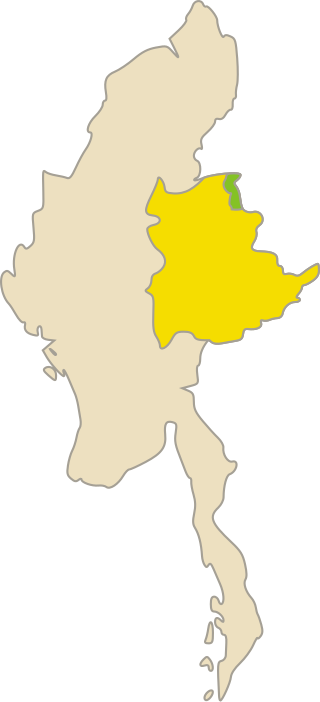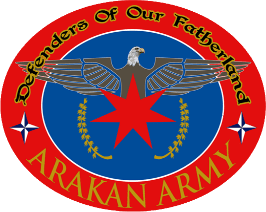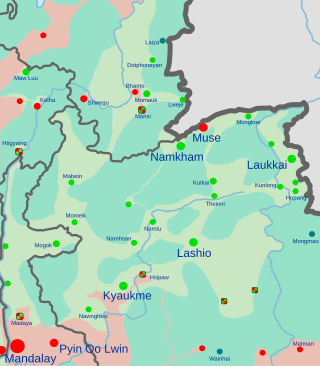
Kokang is a region in Myanmar. It is located in the northern part of Shan State, with the Salween River to its west, and sharing a border with China's Yunnan Province to the east. Its total land area is around 1,895 square kilometers (732 sq mi). The capital is Laukkai. Kokang is mostly populated by ethnic Kokang people, a Yunnanese descendant living in Myanmar.

Myanmar has been embroiled in armed conflict since 1948, when the country, then known as Burma, gained independence from the United Kingdom. The conflict has largely been ethnic-based, with ethnic armed organisations fighting Myanmar's armed forces, the Tatmadaw, for self-determination. Despite numerous ceasefires and the creation of autonomous self-administered zones in 2008, armed groups continue to call for independence, increased autonomy, or the federalisation of Myanmar. It is the world's longest ongoing civil war, spanning almost eight decades.

The Kokang incident was a violent series of skirmishes that broke out in August 2009 in Kokang in Myanmar's northern Shan State. Several clashes between ethnic minorities and the Burmese military junta forces took place. As a result of the conflict, the MNDAA lost control of the area and as many as 30,000 refugees fled to Yunnan in neighbouring China.
Laukkai is the capital of Kokang Self-Administered Zone in the northern part of Shan State, Myanmar. It is located east of the Salween River, which forms part of Myanmar's border with the People's Republic of China at its upper reaches. It is about 10 miles (16 km) away from Nansan, China. In Laukkai, Southwestern Mandarin and Chinese characters are widely used, and the Chinese renminbi is in circulation. It is the main town of Laukkaing Township of the Kokang Self-Administered Zone. It is 117 miles (188 km) from Lashio and 42 miles (68 km) from Kongyan. Its population is 23,435. Laukkai is notorious for its gambling, prostitution, human trafficking and online scams.
Chinshwehaw is a town in Laukkaing Township, Laukkaing District, Shan State of Myanmar. The town borders Qingshuihe Village of the Gengma Dai and Va Autonomous County, Yunnan Province, China. The town is home to one of 5 official border trade posts with China, and opened on 19 October 2003. In 2022, total trade volume at the border post stood at US$283.396 million.

The Kokang Self-Administered Zone, as stipulated by the 2008 Constitution of Myanmar, is a former De facto self-administered zone in northern Shan State. The zone is intended to be self-administered by the Kokang people. Its official name was announced by decree on 20 August 2010. It is recognized as illegal by the Myanmar National Democratic Alliance Army (MNDAA).

The Arakan Army, sometimes referred to as the Arakha Army, is an ethno-nationalist armed organisation based in Rakhine State (Arakan). Founded in April 2009, the Arakan Army is the military wing of the United League of Arakan (ULA). It is currently led by Commander-in-Chief Major General Twan Mrat Naing and vice deputy commander-in-chief Brigadier General Nyo Twan Awng. It is the military wing of the Rakhine ethnic people in Rakhine state where they are the majority. They seek greater autonomy from the Myanmar's central government and wants to restore the sovereignty of Arakan people. It was declared a terrorist organization in 2020 by Myanmar, and again by the State Administration Council junta in 2024.

Mong Ko, sometimes spelled Mongko or Monekoe and also known as Man Kan, Man Guo and Panglong, is a town in Mu Se Township, Mu Se District, northern Shan State, Myanmar.

The Myanmar National Democratic Alliance Army (MNDAA) is an armed resistance group in the Kokang region of Myanmar (Burma). The army has existed since 1989, having been the first one to sign a ceasefire agreement with the Burmese government. The ceasefire lasted for about two decades.

The 2015 Kokang offensive was a series of military operations launched by the Myanmar Army in 2015 in Kokang in northern Shan State, Myanmar (Burma). Several clashes between the Myanmar Army and Myanmar National Democratic Alliance Army had taken place from February to May 2015.

The Ta'ang National Liberation Army is a political organization and armed group in Myanmar. It is the armed wing of the Palaung State Liberation Front (PSLF).
The Muse offensive, also known as the Mong Ko offensive, was a joint military operation by members of the Northern Alliance, consisting of the Arakan Army (AA), the Kachin Independence Army (KIA), the Myanmar National Democratic Alliance Army (MNDAA) and the Ta'ang National Liberation Army (TNLA). The groups targeted towns and border posts along the China–Myanmar border in Muse Township, Myanmar.

Zaw Min Tun is a Burmese army general and the current Deputy Minister of Information in Myanmar. He holds key leadership roles within the military and government, most notably serving as the chief of the Tatmadaw True News Information Team and heading the press team of the State Administration Council (SAC), which governs Myanmar following the military coup in February 2021. Zaw Min Tun has been recognized as a senior spokesperson for the Myanmar Army, particularly following the military coup, which led to widespread political unrest and public protests. His role has been significant in the communication strategies employed by the military during this period, ensuring the conveyance of the regime's narratives to both domestic and international audiences. He oversees the distribution of information through various state-controlled media outlets, which play a critical role in shaping public perception of the military's actions and policies. His leadership positions within the military and government make him a crucial figure in Myanmar's current political landscape. His influence as a spokesperson extends not only to the management of state-run media outlets but also to the strategic direction of the military's public relations efforts, both domestically and internationally. He is tasked with defending and justifying the actions of the military regime, countering the narratives of dissent, and addressing criticisms of human rights abuses and military repression. In his various capacities, Zaw Min Tun works to reinforce the military's stance on governance, national security, and opposition to pro-democracy movements. His efforts to control public perception through carefully crafted media campaigns have become integral to the military junta’s hold on power.

The Myanmar civil war, also known as the Burmese civil war or Burmese Spring Revolution, is an ongoing civil war since 2021. It began following Myanmar's long-running insurgencies, which escalated significantly in response to the 2021 coup d'état and the subsequent violent crackdown on anti-coup protests. The exiled National Unity Government and major ethnic armed organisations repudiated the 2008 Constitution and called instead for a democratic federal state. Besides engaging this alliance, the ruling government of the State Administration Council (SAC), also contends with other anti-SAC forces in areas under its control. Hannah Beech of The New York Times observed the insurgents are apportioned into hundreds of armed groups scattered across the country.
The following is a timeline of major events during the Myanmar civil war (2021–present), following the 2021 military coup d'état and protests. It was also a renewed intensity in existing internal conflict in Myanmar.

Operation 1027 is an ongoing military offensive conducted by the Three Brotherhood Alliance, a military coalition composed of three ethnic armed organisations in Myanmar: the Arakan Army (AA), Myanmar National Democratic Alliance Army (MNDAA), and Ta'ang National Liberation Army (TNLA), allied with other rebel forces in the country, against the Tatmadaw, Myanmar's ruling military junta.
The Three Brotherhood Alliance ;, also known as Brotherhood Alliance, is an alliance between the Arakan Army, Myanmar National Democratic Alliance Army, and the Ta'ang National Liberation Army formed in June 2019.
This is the list of important events happened in Myanmar in 2024.

The Battle of Laukkai was a military offensive conducted by the Myanmar National Democratic Alliance Army (MNDAA) encircling and capturing Laukkai, the capital of the Kokang Self-Administered Zone in northeastern Myanmar. The battle was part of the larger Operation 1027, a joint military operation conducted by the Three Brotherhood Alliance coalition of three ethnic armed organisations and part of the overall renewed civil war in Myanmar.

The Battle of Lashio was an offensive conducted by the Three Brotherhood Alliance, along with other resistance forces, to capture the northern Shan city of Lashio. The headquarters for the Tatmadaw's Northeastern Command, the city was besieged by rebel forces following the collapse of the Chinese-mediated ceasefire that had paused the rebels' Operation 1027.













